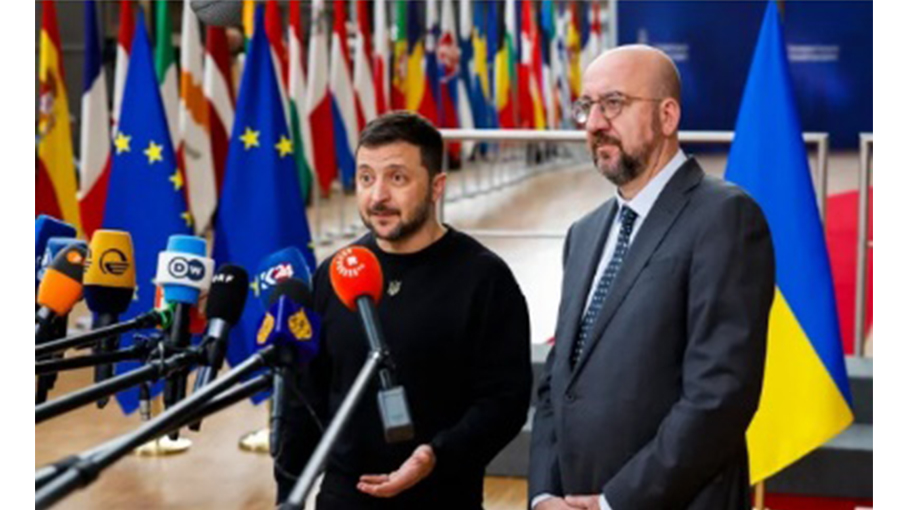Zelenskyy heads to EU, NATO to seek backing for his 'victory plan'

Ukrainian President Volodymyr Zelenskyy said Thursday that support from his embattled nation's Western allies is key to his “ victory plan ” to end the country's devastating war with Russia as he laid out details of the plan to European Union leaders.
He told reporters the plan aims “to strengthen Ukraine" and pave the way for a diplomatic solution to end the conflict on Europe's eastern flank.
“I think that this plan doesn’t depend on Russian will, only on the will of our partners,” he said before addressing leaders at an EU summit.
Zelenskyy was later shuttling across Brussels to meet with NATO defense ministers. The EU is a key supporter of Ukraine, a candidate member of the 27-nation bloc, as it fights Russia's invasion that began more than 2 1/2 years ago.
Zelenskyy outlined the five-point plan to Ukraine’s parliament on Wednesday without disclosing confidential elements that have been presented in private to key allies, including the United States.
The Institute for the Study of War in Washington said that Russian President Vladimir Putin is seeking to draw out the war and he believes "that Russian forces can outlast Western support for Ukraine and collapse Ukrainian resistance by winning a war of attrition.”
NATO Secretary-General Mark Rutte was muted in his response to the plan on Wednesday.
On Thursday he said that Kyiv can rest “absolutely assured that 32 allies are united in making sure that collectively, we will do whatever is needed to make sure that Ukraine can prevail, that (Russian President Vladimir) Putin will not get his way.”
Rutte reiterated that Ukraine’s place is among NATO’s ranks, but he would not say when it might join. Zelenskyy insists that a membership invitation is central to his “victory plan” and would provide his country with the ultimate security guarantee to protect it from Russia.
“Ukraine will be a member of NATO in the future,” Rutte said. “The question is exactly about the ‘when.’ I cannot answer that now.”
However, Rutte said, Putin must understand that “we are in this, if necessary, for the long haul. And obviously we want to be in a place where Zelenskyy and Ukraine, from a position of strength, is able to start talks with Russia.”
Major points of the plan include an invitation for Ukraine to join NATO and permission to use Western-supplied longer-range missiles to strike military targets deep inside Russia, steps that have been met with reluctance by Kyiv’s allies so far.
German Chancellor Olaf Scholz downplayed the chances of Berlin changing its opposition to the use of long-range weapons against Russian targets.
"You know Germany’s position on the questions that are touched on here; nothing will change about this,” he said.
Zelenskyy said he needs to "move some partners forward” on the issue. “And I think only with the unity in EU we can move and can move not only EU leaders, we can move other leaders.”
A draft copy of EU summit conclusions — a text that will likely be tweaked before publication at the end of Thursday's meeting — reaffirms the bloc's “unwavering commitment to providing continued political, financial, economic, humanitarian, military and diplomatic support to Ukraine and its people for as long as it takes and as intensely as needed. Russia must not prevail.”
Thursday's talks in Brussels come as Ukrainian troops are struggling to hold off better-equipped Russian forces, especially in the eastern Donetsk region where they are gradually being pushed back. Kyiv is surviving with Western help, but Ukraine says it is coming too slowly.
Lithuanian President Gitanas Nauseda criticized slow Western decision-making over Ukraine and said it “would be a great mistake to think that our hesitance is the best way to de-escalation.”
If Western allies bolstered support to Kyiv, leading to gains on the ground for Ukrainian forces, “then I think Putin would be pressed to go to negotiations table. Right now, he thinks he is prevailing," he said when entering the EU summit.
Finnish Prime Minister Petteri Orpo said EU leaders “have to give a strong signal and unified signal that we continue to support Ukraine as much and as long as needed.”
At their summit in Washington in July, the 32 NATO members declared Ukraine on an “irreversible” path to membership.
But for now, NATO is in a holding pattern. Its biggest and most powerful member, the United States, is facing a presidential election. European allies expect little movement on Ukraine until a new president takes office in January.
Beyond that, the United States and European heavyweight Germany remain deeply concerned about being dragged into a wider war with nuclear-armed Russia, and they lead a group of countries that oppose allowing Ukraine to join NATO until the conflict ends.




